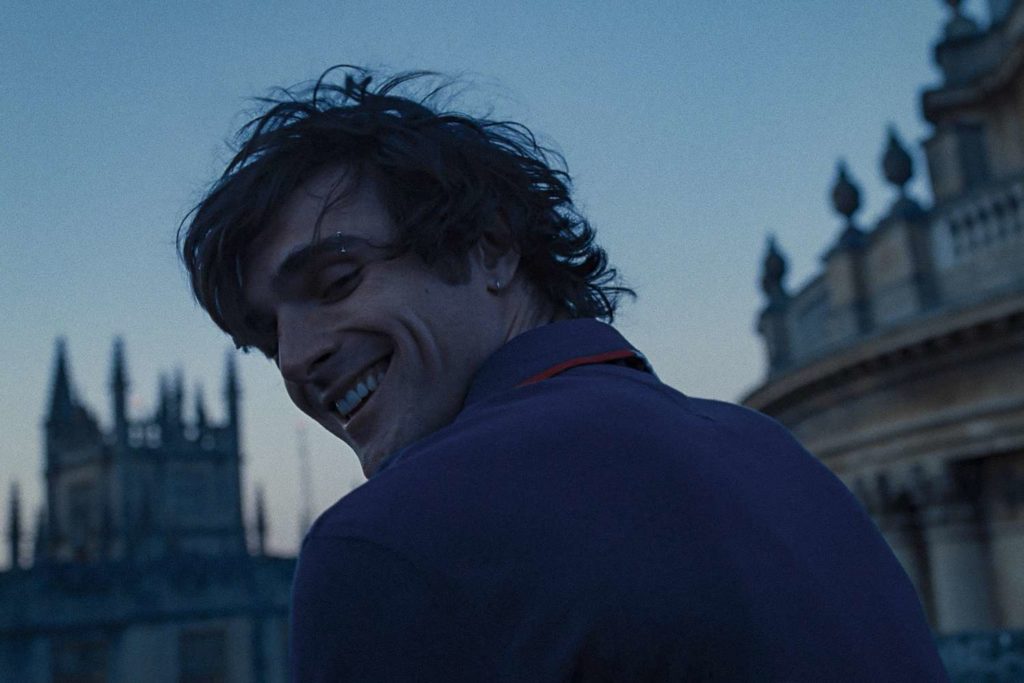
There’s a strong sense of finality from the very earliest moments of Saltburn (2023) – but how so? The film opens with a monologue – either a confession, or a survivor’s statement – and whilst it feels fairly clear it’s going to be one of those things, it holds off for the lion’s share of its runtime: nonetheless, we are introduced to someone called Felix by proxy, via a young man called Oliver (Barry Keoghan in his first proper lead role – and what a role). This is their history, or it’s an admission of Oliver’s love – and the voyeurism which always accompanies love in the film. It’s all queasy obsession and/or earnest admiration, and it brings us up to the opening credits (impressive cast and all).
But then we duck out of the framing narrative and back to 2006 – for no particular reason really, other than perhaps placing the film at the rough time that director and writer Emerald Fennell was herself at Oxford University. For it’s to Oxford Uni we go, a camera following the arrival of a lone new student, Oliver. He is an outsider here, and he brings a certain amount of outsider awkwardness to what would in any circumstances be a testing time and place, but Oliver is sharp, ready to assert his knowledge. I half expected him to tell Professor Ware (Reece Shearsmith) to ‘do it on the radio’. He soon begins to pick up what it means to be an Oxford student, even whilst bristling at its many discomforts. The film does sterling work – neither labouring the point, nor ignoring it – albeit establishing what many people already know, that the barriers to belonging at Oxbridge are not academic; people from the unknown provinces, even in the North, can read and think well enough; what they struggle with are the unspoken cues, the confidence of just being in that environment or, as one of the film’s most acerbic bystanders, Farleigh, asserts later, ‘passing’.
Oliver doesn’t have that shared culture, and might have passed his four years at Oxford on the sidelines, but a chance meeting with the beautiful, aristocratic Felix (Jacob Elordi) gets him an ‘in’. Felix, for all his swagger, is equipped to be kind to Ollie, and takes him under his wing, protecting him from the irritated or dismissive carping of his wealthier, more easeful peers. A friendship forms. Ollie begins to blossom from a poor kid made good into a young man with clear complexities, many of which stem from his troubled past, one which he does not want to discuss (the film chooses its narrative gaps carefully, and recasts them later). But Felix persists, and feels compelled to invite Ollie to stay with him at his family home – Saltburn – after the summer exams.
The film could have been a compelling, often charming look at university life, and happily stayed put: it manages a great balance between representing the dreamy fun of first independence with all the sour notes, the loneliness, the awkwardness, the all-consuming fatigue of negotiating new social groups and identities. But it turns out that Oxford is simply a prologue to the film proper, the time spent at Saltburn itself. In moving to this location which, by the by, Fennell feels able to do without announcing that This is a New Chapter, we suddenly find ourselves with a new cast of characters: the Cattons are old money, with a perhaps cliché eccentric father, Sir James, who remains excellent fun (Richard E. Grant), a beautiful, ex-model mother, Elspeth, who delivers the film’s funniest lines (Rosamund Pike) and a disenchanted younger sister, Venetia (Alison Oliver). Venetia: now there’s a name you encounter but rarely in the Wirral. Oh, and there’s a glamorous hanger-on, ‘dear’ Pamela (Carey Mulligan), who has camped out at the house while she gets over a disastrous breakup, but it’s clear that outsiders have a limited period of tolerance, and she has almost reached hers. Likewise, Felix and Oliver’s ‘friend’ Farleigh (Archie Madekewe) is here too, delivering the barbs.
Oliver is, perhaps rightly and fairly, mesmerised by Saltburn: as we accompany Oliver through that long take of Felix showing him around for the first time, we might feel a little dazzled, too. And perhaps something shifts in him here; or is it elsewhere, earlier? It’s a question which could be asked, and one which has run through and through my mind since watching the film. His already obsessive interest in Felix begins to curdle, to darken: not for the first time – as Ollie’s odd, watchful behaviour reaches new excesses – he seems to be channelling the Shakespearean character of Iago: the reticence, the status angst, the gnawing envy over people he sees as better than him (speaking of the gentleman soldier Cassio, Iago admits, ‘he hath a daily beauty in his life which makes me ugly’. That line could fit well in Saltburn.) So Saltburn itself prompts a change, and the house and grounds are filmed like a painterly, abundant oasis. Only certain obsessive, shocking acts here could ever snap you out of your dreamlike admiration for the languid, eternal summer at Saltburn. Parties, sunbathing, swimming – here, everything is colour, comfort and easy splendour. But the film is punctuated by symbols – spirals, mazes, mists – which hint at artifice, secrecy and disorientation. And so it comes to pass.
Keoghan is enthralling. At first Oliver is vulnerable and sympathetic, but straight away displays hints of something simmering, something kindled by his youthful affection for Felix. Mesmerising to watch, Keoghan holds all of his character’s mixed feelings together: the worship, the envy, the disbelief, the glut of emotions triggered by Felix’s perfect-seeming existence. It’s not the first time Keoghan has taken on a role like this – his performance in The Killing of a Sacred Deer feels preparatory – but here it’s much more his own, and a much more well-formed role, too. Elordi is also perfect casting here, all charm and confidence. Does he have layers? Maybe, maybe not: his deepest impulses genuinely seem to be to support his loved ones, even if Ollie is probably, for him, a passing phase. Throughout all of this, there’s a witty script with droll humour to cleanse the palate, though this never completely dispels the nagging suspicion that for the Cattons, Ollie is seen as a curio, little more: it’s in how he deals with this that the narrative is propelled forward. And how!
As things move from Shakespeare to sensation novel, Saltburn may lose the goodwill of some audiences, who may feel that an often subtle character study has moved from the sublime to the ridiculous; personally, I though it worked incredibly well. I also understand some of the criticisms which frame it as, ultimately, all rather reactionary, but as the film detaches from its verisimilitude into its nightmarish aspects – sometimes, admittedly, a little unevenly – this felt less and less serious to me, becoming more of a Grand Guignol performance than social realism. It depends how thick your skin is, I guess, but there is so much to admire and to love and to gawp at in this film. The golden summer, the life-changing friendship, the fantasy location: they are all put under fantastical, acutely-realised pressure here. It’s an astonishing cinematic experience, both oddly light and viscerally nasty.
Saltburn (2023) is on general release now.
